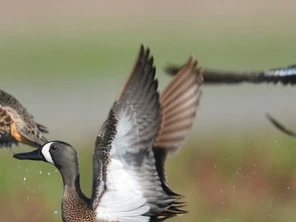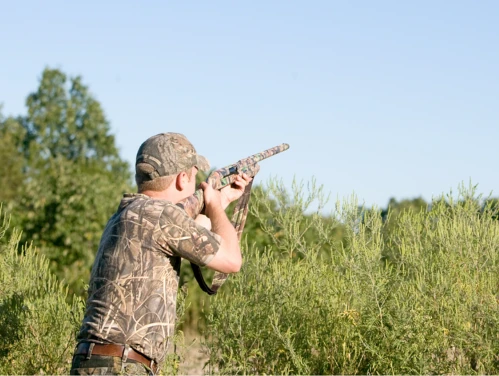On this page...
Weekly Updates - Wetland Habitat & Fall Migration Reporting

Iowa's Hunting Regulations
-
2025/26 Iowa Hunting, Trapping, & Migratory Game Bird Regulations
Full regulations booklet, ready for download.
-
2025/26 Iowa Hunting Seasons & Limits Card
Quick reference printable card.
-
2025/26 Iowa Migratory Game Bird Seasons & Limits Card
Quick reference printable card.
-
Iowa Waterfowl Hunting Maps
Waterfowl, metropolitan goose, and canada goose hunting maps.
-
Get Your Hunting License Online
Purchase your hunting and fishing licenses now.
-
Resident Licenses & Applications
Resident licensing applications, requirements, dog trials, establishing residency in Iowa, and more.
-
Nonresident Hunting & Applications
Nonresident hunting guide, maps, forms, & more.
-
Interactive Hunting Atlas
Our interactive hunting atlas makes it easier to find areas open to public hunting.
-
Hunting Atlas Boundaries for Google Earth (*.kmz)
Hunting Atlas Boundaries for Google Earth, downloadable file
-
Find a Hunter Education Class
A person who is 11 years old or older may enroll in a course.
-
Turn In Poachers
If you see poaching, call 1-800-532-2020.
-
Report Your Harvest
Submit your harvest online, call 1-800-771-4692, or text and follow the prompts.
Migratory Game Bird Seasons
List items for Calendar - Iowa Hunting Seasons, Migratory Game Bird
| Season | North Zone | Central Zone | South Zone |
|---|---|---|---|
| Youth Waterfowl | Sep. 20 - 21 | Sep. 27 - 28 | Oct. 4 - 5 |
| Ducks, Mergansers & Coots | Sep. 27 - Oct. 3 | Oct. 4 - Oct. 10 | Oct. 11 - Oct. 17 |
| Oct. 11 - Dec. 2 | Oct. 18 - Dec. 9 | Oct. 25 -Dec. 16 | |
| Dark Geese & Light Geese | Sep. 20 - Oct. 5 | Sep. 27 - Oct. 12 | Oct. 4 - Oct. 19 |
| Oct. 11 - Dec. 2 | Oct. 18 - Dec. 9 | Oct. 25 - Dec. 16 | |
| Dec. 13 - Jan. 10 | Dec. 20 - Jan. 17 | Dec. 27 - Jan. 24 |
| Statewide Seasons | Dates |
|---|---|
| Special September Teal | Sep. 6 - 14 |
| Doves | Sep. 1 - Nov. 29 |
| Snipe | Sep. 6 - Nov. 30 |
| Rail | Sep. 6 - Nov. 14 |
| Woodcock | Oct. 4 - Nov. 17 |
- Metropolitan Canada Goose Hunting Season* (in specified areas): Sep. 13 - 21
- Light Goose Conservation Order*: Jan. 25 - May 1, 2026
*Additional regulations apply.
We work hard to keep our calendars current, but always refer to the Iowa Hunting, Trapping, & Migratory Game Bird Regulations for official, legal season dates.
Migratory Game Bird FAQs
List items for Migratory Game Birds FAQs
The links below provide maps of areas closed to the hunting of Canada geese. Additional refuge areas exist on some state wildlife management areas that are closed to ALL hunting. These maps are provided as a convenience to hunters to increase awareness of areas closed to the taking of Canada geese. Every effort has been made to insure the accuracy of these maps; however, the boundaries shown on these maps are approximate representations, and hunters should consult the Waterfowl Hunting Map Book.
Why is the DNR banding ducks and geese?
When banded birds are recovered by hunters or recaptured by other banders and the recovery/recapture information is reported to the USGS Bird Banding Lab, we can learn how long the bird has lived and where it is at a specific time of the year. Banding projects that are implemented during brood-rearing or nesting periods can also tell us where birds go to reproduce and, in some cases, if they nested. Band recoveries from birds killed by hunters tell us where and when the birds from the banded population are being harvested. If a large enough sample of birds are banded and recovered annually, biologists can estimate the average survival of the birds in the population. This is important for monitoring the status of most populations of ducks and geese, but particularly important for species that cannot be directly counted such as wood ducks.
How many ducks and geese are usually banded in Iowa?
DNR Wildlife Staff band approximately 2,000 wood ducks and 4,000 Canada geese in Iowa each year. Ducks and geese are banded throughout the state. Most of the banded birds are young-of-the-year, i.e., they hatched the same year they were banded.
When are geese and ducks banded in Iowa?
Geese are banded in late June and early July, while in their flightless stage. Ducks are banded after ducklings have attained a size adequate for handling and attaching bands without harming the birds, usually beginning in late July and continuing until the first week in September. The June 2000 Wildlife Bureau Featured Activity article "June means Jewelry for Geese" provides information regarding the Bureau's annual goose banding activities.
If I recover a banded bird while I'm hunting, can I keep the band?
Yes, you can keep the band. Many hunters like to collect their bands as mementos of their hunts. We only ask that you report the band number, and the date and location where you harvested the bird.
To whom should I report the banded duck (or goose) that I shot?
You should report all banded ducks and geese that you recover to the Bird Banding Laboratory (BBL) in Washington D.C. The BBL keeps records of all migratory birds banded in North America. Bands can be reported at reportband.gov. The BBL will send you a certificate with information about the banded bird that you recovered.
Want to learn more about bird banding?
The U.S. Geological Survey - Patuxent Wildlife Research Center - Bird Banding Laboratory coordinates all bird banding done in the United States and maintains records of band recoveries. For additional information regarding the hows and whys of bird banding we recommend visiting the Bird Banding Lab's site.
Dog training has deep roots in hunting and conservation culture. In order to develop dogs that can reliably hunt and recover game, it is vital to train with a variety of game under varying conditions. It is important that dog trainers and clubs know the rules concerning use of game during training to both support wildlife conservation and stay out of trouble with the law. Many state and federal laws and regulations apply to the importation, possession, use and disposal of game used in training and field events. These rules serve two general purposes: to protect the health and welfare of native wildlife populations in Iowa, and to ensure that hunting regulations are enforceable.
Dog training refers to any teaching or exercising activity involving sporting dogs in which the primary purpose is to enhance performance. Sporting dogs are utilized for hunting game birds and game mammals and include breeds as pointers, setters, retrievers, and hounds.
Regulations governing the training of sporting dogs vary according to what species the dogs are being trained with and where the training takes place.
Metropolitan Canada goose seasons are open on specified dates during the first two weeks of September in the Des Moines, Cedar Rapids-Iowa City, and Waterloo-Cedar Falls zones.
Canada Goose Zone boundary Maps:
Fill with several inches of course wood shavings (not sawdust) and place on pipes over water. Erecting the boxes over land or in trees invites predators and extra measures must be taken to predator proof your nest box.
Federal Duck Stamp
Federal Duck Stamp
Iowa migratory bird hunters can buy their Federal Duck Stamp in the form of an E-Stamp through all Iowa license vendors and through the Go Outdoors Iowa online portal.
The E-Stamp is now valid for the entire hunting season. The physical stamp will be mailed to the address on file March 10 - June 30. Hunters are responsible to make sure their address on file is current.
Questions? Visit the US Fish & Wildlife Service website.
Harvest Information Program (HIP)
Harvest Information Program (HIP)
Hunters who plan to pursue migratory game birds are required to register annually for Harvest Information Program (HIP). Migratory game birds mean more than ducks and geese; it includes ducks, geese, coots, doves, woodcock, rails, and snipe.
Once registered, hunters will need to write their confirmation number on the line provided at the top of their hunting license as proof of registration.
Need help? Check out our HIP Guide for Mobile Devices and our HIP Guide via Website submission.
